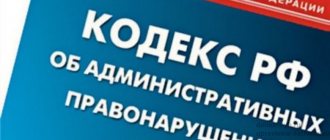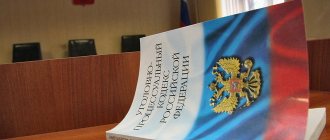Commentary to Art. 241 of the Criminal Code of the Russian Federation
The object of the crime is public morality.
An optional subject is relations to protect human health.
The objective side is expressed by several alternative actions: 1) actions aimed at organizing prostitution by other persons; 2) maintaining dens for prostitution; 3) systematic provision of premises for prostitution.
Criminal Code of the Russian Federation in Art. 33 defines that “an organizer is a person who organized the commission of a crime or supervised its execution, as well as a person who created an organized group or criminal community (criminal organization) or supervised them.”
Based on this definition, two forms of actions by the organizers of the brothel can be distinguished: actions as a result of which the brothel arises (for example, choosing a location, etc.); actions that make it possible to use the den in accordance with the purposes of its creation (selection of prostitutes, search for clients, purchase of food and alcoholic beverages, etc.).
The organization of dens for prostitution is the activity of one or more persons aimed at creating a den and its functioning. The nature of the actions of persons organizing brothels can be different: development of a plan for creating a brothel and its implementation, selection (selection) of a room or other place for use as a brothel; selection of “personnel” providing sexual services, search for clients, etc. Organizational activities can be distributed among several members, when one is looking for premises for a brothel, and the other attracts clients to it. The actions of these persons, covered by a common purpose, must be qualified as co-execution under Art. 241 of the Criminal Code of the Russian Federation without reference to Art. 33 of the Criminal Code of the Russian Federation.
Organizing a brothel is a completed crime not from the moment when prostitution actually begins in it, but from the moment when the brothel is created and ready to function, regardless of whether the purpose of its creation is realized.
The owner of a brothel may be a person in whose possession or disposal there is a premises or any place in which intimate services are provided for a fee. Possession or disposal of a premises or place can be carried out legally or arbitrarily. In order for a person to have the contents of maintaining a brothel in his actions, it is necessary to establish the systematic provision of a brothel. A one-time provision of premises for sexual intercourse with a person engaged in prostitution does not constitute a crime. The maintenance of a brothel includes the following activities: receiving prostitutes and clients; making settlements with clients; brothel security; maintaining order in it; provision of food, alcoholic beverages, payment of utilities, etc.
Brothel maintenance is an activity designed to repeatedly provide premises or other places for prostitution. The act should be considered completed from the moment the brothel begins to be maintained. The concept of “keeping a den” does not include activities related to the use of places accessible to everyone, to which a person has no connection, for example, a basement or attic. The corpus delicti is formal.
The subjective side of the crime is characterized by guilt in the form of direct intent. A mandatory element of the crime is the purpose of prostitution.
The general subject of the crime is a sane person who has reached the age of sixteen.
In Part 2 of Art. 241 of the Criminal Code of the Russian Federation establishes liability for the same acts committed: a) by a person using his official position; b) with the use of violence or the threat of its use; c) using an obviously minor for prostitution.
Persons using their official position to organize prostitution include officials of state bodies, local government bodies, state and municipal institutions, civil servants and employees of local government bodies, as well as managers and employees of commercial and non-profit organizations that are not government bodies, local governments, state and municipal institutions.
The concepts of the use of violence or the threat of its use are similar to the corresponding concept considered in relation to the elements of involvement in prostitution (Article 240 of the Criminal Code of the Russian Federation).
The use of a person known to be a minor for prostitution involves the involvement in prostitution of a person known to be under the age of eighteen by the perpetrator (see also the commentary to Article 240 of the Criminal Code of the Russian Federation).
Acts provided for in Part 1 or Part 2 of the article in question, committed with the use of persons known to be under fourteen years of age for prostitution, entail liability under Part 3 of Art. 241 of the Criminal Code of the Russian Federation.
Judicial practice under Article 241 of the Criminal Code of the Russian Federation
Appeal ruling of the Judicial Collegium for Criminal Cases of the Supreme Court of the Russian Federation dated 02/09/2018 N 1-APU17-12
In his opinion, the reliability of K.’s testimony is also affected by the fact that he himself could essentially be held accountable under Art. 241 of the Criminal Code of the Russian Federation, as evidenced by the relevant procedural documents available in the case. It is noteworthy that the court (p. 122 of the verdict), concluding that Sokolov, Shkaev, Sivkov and Zheksembaev had previously determined the roles and location of the crime, did not provide evidence to support these conclusions.
Appeal ruling of the Judicial Collegium for Criminal Cases of the Supreme Court of the Russian Federation dated October 31, 2018 N 11-APU18-20SP
acquitted of the charge of committing a crime under paragraph “b” of Part 2 of Art. 241 of the Criminal Code of the Russian Federation, on the basis of paragraphs 1 and 4 of Part 2 of Art. 302 of the Code of Criminal Procedure of the Russian Federation for the absence of a crime in connection with the rendering of a not guilty verdict by the jury, with the recognition of his right to rehabilitation in this part,
Appeal ruling of the Judicial Collegium for Military Personnel Cases of the Supreme Court of the Russian Federation dated 02/05/2019 N 205-APU19-2
As follows from the case materials, the trial, starting from the preparatory part of the court hearing and ending with the sentencing (from May 25 to October 15, 2022), in accordance with Art. 242 of the Code of Criminal Procedure of the Russian Federation was carried out by judges O., K. Zh. and with the direct participation of the defendant Gugov I.A., as provided for in Part 6.1 of Art. 241 of the Criminal Code of the Russian Federation.
Appeal ruling of the Judicial Collegium for Criminal Cases of the Supreme Court of the Russian Federation dated April 24, 2019 No. 5-APU19-34
considered at the court hearing the appeal of Mamyrkanov E.T. on the resolution of the Moscow City Court dated March 22, 2022, by which the complaint of Mamyrkanov Eldiyar Telekovich, ..., on the resolution of the Deputy Prosecutor General of the Russian Federation dated February 25, 2022 on his extradition to law enforcement agencies of the Kyrgyz Republic for prosecution under Part 1 of Art. 241 of the Criminal Code of the Kyrgyz Republic was left without satisfaction.
Resolution of the Presidium of the Supreme Court of the Russian Federation dated May 16, 2018 N 31P18
According to the verdict of the Oktyabrsky District Court of Irkutsk dated March 29, 2010, Mandrykin A.V. convicted under Part 1 of Art. 241 of the Criminal Code of the Russian Federation to imprisonment for a period of 2 years, under paragraph “a”, part 2 of Art. 240 of the Criminal Code of the Russian Federation (as amended by Federal Law of December 8, 2003 N 162-FZ) - to imprisonment for a period of 3 years, under paragraphs “a”, “c”, part 2 of Art. 240 of the Criminal Code of the Russian Federation (as amended by Federal Law No. 162-FZ of December 8, 2003) - to imprisonment for a period of 3 years 6 months. Based on Part 3 of Art. The Criminal Code of the Russian Federation for the totality of crimes, by partial addition of punishments, was finally assigned to Mandrykin A.V. punishment in the form of imprisonment for a period of 5 years to be served in a general regime correctional colony.
Resolution of the Presidium of the Supreme Court of the Russian Federation dated January 23, 2019 N 255P18
Artamonov Vladimir Yuryevich, ... was detained on April 20, 2010 in accordance with Art. Art. 91, 92 of the Code of Criminal Procedure of the Russian Federation on suspicion of committing crimes under paragraph “a” of Part 2 of Art. 241, part 1 art. 285 of the Criminal Code of the Russian Federation.
Appeal ruling of the Judicial Collegium for Criminal Cases of the Supreme Court of the Russian Federation dated July 18, 2017 N 49-APU17-9
- clause “b”, part 2, art. 241 of the Criminal Code of the Russian Federation to 3 years with restriction of freedom for 1 year; - part 3 art. 240 of the Criminal Code of the Russian Federation to 4 years with restriction of freedom for 1 year; - part 1 art. 163 of the Criminal Code of the Russian Federation (for the episode of February 20, 2015 in relation to R.) to 2 years;
Appeal ruling of the Judicial Collegium for Criminal Cases of the Supreme Court of the Russian Federation dated November 9, 2017 N 73-APU17-19
Litvinova Tatyana Evgenievna, ... convicted by the verdict of the Zheleznodorozhny District Court of Ulan-Ude dated November 18, 2016 under Part 2 of Art. 210, paragraphs “b”, “c”, part 2 of Art. 241, part 3 art. 240, part 3 art. 240, part 3 art. 240 of the Criminal Code of the Russian Federation to 2 years 3 months of imprisonment in a general regime correctional colony, -
Appeal ruling of the Judicial Collegium for Criminal Cases of the Supreme Court of the Russian Federation dated July 20, 2017 N 49-APU17-8
sentenced to imprisonment under Part 2 of Art. 209 of the Criminal Code of the Russian Federation for a period of 8 years with restriction of freedom for 6 months, under Part 3 of Art. 240 of the Criminal Code of the Russian Federation for a period of 3 years, under Part 1 of Art. 241 of the Criminal Code of the Russian Federation for a period of 2 years; and to correctional labor under Part 1 of Art. 139 of the Criminal Code of the Russian Federation for a period of 5 months with a monthly deduction of 10% of wages to the state income.
Appeal ruling of the Judicial Collegium for Criminal Cases of the Supreme Court of the Russian Federation dated June 17, 2020 No. 3-APU19-10
It is noteworthy that witness P. stated in court that his testimony at the investigation was rumors and speculation, and does not confirm them. And A.’s testimony (protocol dated March 30, 2015, pp. 96, 104 - 105) refutes the verdict against him dated October 4, 2011 under Art. 241 of the Criminal Code of the Russian Federation (vol. 86, pp. 231 - 233), where A. admits that he organized everything himself.
Resolution of the Presidium of the Supreme Court of the Russian Federation dated November 11, 2020 N 88P20
Kotovsky Alexander Alexandrovich, ... was detained on May 18, 2016 in accordance with Art. Art. 91, 92 of the Code of Criminal Procedure of the Russian Federation on suspicion of committing a crime under paragraph “b” of Part 2 of Art. 241 of the Criminal Code of the Russian Federation. On May 20, 2016, by a judge of the Naberezhnye Chelny City Court of the Republic of Tatarstan in relation to Kotovsky A.A. a preventive measure was chosen in the form of detention for a period of 1 month 19 days, that is, until July 7, 2016.
Art. 241 part 1 of the Criminal Code of the Russian Federation (organization of a den for prostitution) 2
Art. 241 part 1 of the Criminal Code of the Russian Federation (the criminal case is in the Meshchansky Court of Moscow). Defense of a defendant accused of running a prostitution den. He does not admit his guilt. This illegal act is punishable by up to 5 years in prison. At present, the judicial investigation has been formally completed (all available evidence has been examined), however, the Meshchansky Prosecutor's Office of Moscow petitioned the court to postpone the judicial debate to provide additional evidence.
Judicial arguments took place, the prosecution asked for 2 years in prison, the defense to acquit.
The verdict was announced, which imposed a sentence of 1 year in prison.
The lawyer filed a cassation appeal:
Chamber of Lawyers of the Moscow Region
Bar Association "TRUST"
TIN 7707318584/770701001, Moscow, st. Novoslobodskaya, 31, building 2
Postal address: 101000, Moscow, st. Varvarka, 14, office 205, t. 727-51-19, t. 926-279-22-67
Account No. 40703810238060115127 in the AK SB RF, BIC 044525225
K/s 30101810400000000225, Tsaritsyn branch No. 7978
To the Judicial Collegium for Criminal Cases of the Moscow City Court
Moscow, st. Bogorodsky Val, 8, 107076
From the defender - lawyer Sergei Nikolaevich Kuznetsov in defense of the interests of convicted __________________, held in IZ-77/6 in Moscow
APPEAL
(on the verdict of the Federal Judge of the Meshchansky District Court of Moscow)
By the verdict of the Meshchansky District Court of Moscow dated November 12, 2009, the defendant ______________ was found guilty of committing a crime under Part 1 of Art. 241 of the Criminal Code of the Russian Federation and she was sentenced to imprisonment for a period of 1 (one) year in a general regime colony.
However, this sentence must be changed due to the discrepancy between the court's conclusions set out in the sentence and the actual circumstances of the criminal case; violations of criminal procedural law and the injustice of the sentence due to its excessive severity.
1. Thus, the court based the verdict on evidence obtained in violation of the Criminal Procedure Law:
- information contained in the inspection protocol of items dated April 7, 2009 (inspection of banknotes in the amount of 3 pieces, in denominations of 1000 rubles; mobile phones, SIM cards, etc.) (vol. 1 pp. 171-174), obtained in violation of the Code of Criminal Procedure of the Russian Federation and must be excluded from evidence as inadmissible. Thus, the investigator examines the above-mentioned items, but at the same time they (the inspected objects themselves) illegally appeared in the possession of the investigator.
In accordance with the personal search protocol, the items were confiscated from ____________ by the duty officer for the analysis of those delivered by the Department of Internal Affairs in the Basmanny District of Moscow, ________ and the latter they (the items) were not transferred to anyone else (there is no document confirming the contrary in the criminal case materials).
According to Part 1 of Art. 183 of the Code of Criminal Procedure of the Russian Federation (grounds and procedure for seizure) - if it is necessary to seize certain items and documents that are important for a criminal case, if it is known exactly where and who they are, a seizure is carried out, about which a decision is made, and the seizure itself is confirmed by the protocol.
There is no resolution or protocol for the seizure of funds and other items examined by the investigator in the materials of this criminal case. Moreover, in the resolution on the provision of the results of operational investigative activities dated March 27, 2009 (vol. 1, case file 103), they are (cash, mobile phones, etc.) as transferred items (documents), are not listed.
— Similarly, inadmissible evidence, that is, obtained in violation of the Code of Criminal Procedure of the Russian Federation includes information contained in the personal search protocol _______________ (vol. 1, pp. 13), which must be excluded from evidence.
Thus, according to the contents of the above protocol, the person conducting the search was guided by the norms of the Code of Criminal Procedure of the Russian Federation (the rights of witnesses are explained in accordance with Article 60 of the Code of Criminal Procedure of the Russian Federation), the search itself was carried out on the basis of Art. 176 of the Code of Criminal Procedure of the Russian Federation (grounds for conducting an inspection), 177 of the Code of Criminal Procedure of the Russian Federation (procedure for conducting an inspection) for the purpose of “... detecting traces of a crime and other material evidence...”. This investigative action was carried out by an unauthorized official (without an order from the investigator), before the initiation of a criminal case.
At the same time, according to part 2 of Art. 176 of the Code of Criminal Procedure of the Russian Federation - before initiating a criminal case, it is possible to carry out the only investigative action - an inspection of the scene of the incident. The above investigative action (personal search) does not apply to him.
In addition, from the contents of the document called “continuation” (vol. 1, pp. 14), the only correct conclusion does not follow that the funds specified in this document were seized specifically from _______ (vol. 1, pp. d . 14). All items and documents that were seized from the defendant __________ are indicated on the back of volume 1 l. d. 13- “a white plastic bag containing cell phones and SIM cards.”
The court's arguments about the absence of any violations on the part of the body conducting the preliminary investigation, set out on sheet 16 of the appealed verdict, are not based on the actual data of the criminal case and the Criminal Procedure Law.
2. The appealed verdict could not be passed, since the indictment in this criminal case was drawn up with significant violations of the criminal procedural law; the indictment was approved by an unauthorized official. So, according to part 4 of Art. 225 of the Code of Criminal Procedure of the Russian Federation, the indictment drawn up by the inquiry officer is approved by the head of the inquiry body.
According to clause 1 of part 1 of Art. 40 of the Code of Criminal Procedure of the Russian Federation, the bodies of inquiry include the internal affairs bodies of the Russian Federation.
According to paragraph 17 of Art. 5 of the Code of Criminal Procedure of the Russian Federation, the head of the body of inquiry is an official of the body of inquiry, including the deputy head of the body of inquiry, authorized to give instructions on the conduct of inquiry and urgent investigative actions, to exercise other powers provided for by the Code of Criminal Procedure of the Russian Federation (that is, the heads of the Main Internal Affairs Directorate, Department of Internal Affairs, Department of Internal Affairs and their substituents).
According to paragraph 17-1 of Art. 5 of the Code of Criminal Procedure of the Russian Federation, the head of the inquiry unit is an official of the inquiry body, heading the corresponding specialized unit that carries out the preliminary investigation in the form of an inquiry, as well as his deputy (that is, the heads of departments, divisions and departments carrying out the investigation in the form of an inquiry).
According to this criminal case, the indictment was approved by the acting head of the Internal Affairs Directorate for the Central Administrative District of Moscow, police major _________, that is, the person acting as the head of the unit that carries out the preliminary investigation in the form of an inquiry of the Internal Affairs Directorate for the Central Administrative District of Moscow.
However, taking into account the above, the indictment in this criminal case should have been approved by the head of the Internal Affairs Directorate for the Central Administrative District of Moscow or his deputy.
3. In the descriptive and motivational part of the appealed sentence, as a qualifying feature, it is indicated that the crime provided for in part 1 of Art. 241 of the Criminal Code of the Russian Federation in a group of persons by prior conspiracy with an unidentified accomplice. This feature was taken into account by the court when determining the type and amount of punishment (case file 18 of the appealed sentence “when assigning a sentence to the defendant... the court takes into account the nature and degree of public danger of the crime she committed..."). However, this thesis of the court is not based on factual data established at the court hearing; evidence confirming the above thesis is not provided in the appealed verdict.
In addition, the commission of the above crime in a group of persons by prior conspiracy is refuted by the materials of the criminal case. Namely, the resolution on the separation of the materials of the criminal case into separate proceedings (vol. 1, pp. 288-289), according to which the allocated materials in relation to the unidentified accomplice were sent for additional verification to the 4th department of ORCh 7 through the UR ATC in the Central Administrative District of Moscow. No criminal case was initiated against the unidentified accomplice.
The body that conducted the preliminary investigation established in the indictment that the crime was committed by two persons, convicted __________ and an unidentified person, but at the same time, criminal prosecution is not being conducted against the unidentified person. This contradiction was not resolved at the trial, despite repeated requests from the defense.
Thus, without having evidence confirming the existence of a preliminary conspiracy among the convicted ________, the court unfoundedly pointed to this sign and for this reason could not reveal the content of the preliminary conspiracy: what the conspiracy was aimed at, what it consisted of and how the roles were distributed between the accomplices .
Based on this, the element of committing a crime in a group of persons by prior conspiracy should be excluded from the descriptive and motivational part of the appealed sentence, and the sentence should be reduced.
Based on the above, guided by art. Art. 354, 379 Code of Criminal Procedure of the Russian Federation,
ASK:
The verdict of the Meshchansky District Court of Moscow dated November 11, 2009, according to which gr. __________________ was found guilty of committing a crime under Part 1 of Art. 241 of the Criminal Code of the Russian Federation and she was sentenced to imprisonment for a period of 1 year with detention in a general regime colony - amend the term of punishment, imposing a sentence of 8 months of imprisonment.
Sincerely,
Lawyer ___________ (Kuznetsov S.N.)
By cassation ruling, the verdict of the Meshchansky District Court of Moscow was changed, the punishment was reduced to 9 months of imprisonment.






